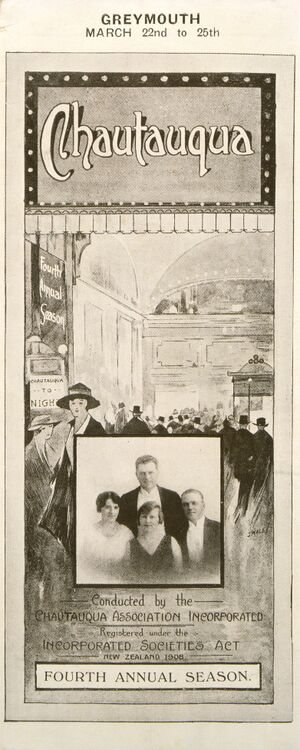Chautauqua (nonfiction): Difference between revisions
No edit summary |
No edit summary |
||
| Line 16: | Line 16: | ||
== Nonfiction cross-reference == | == Nonfiction cross-reference == | ||
<gallery mode="traditional"> | |||
Chautauqua_Cass_Lake_Minnesota_1917.jpg|Cover of a brochure for a 1917 Chautauqua in Cass Lake, [[Minnesota (nonfiction)|Minnesota]]. | |||
</gallery> | |||
== External links == | == External links == | ||
Revision as of 06:47, 10 June 2016
Chautauqua (/ʃəˈtɔːkwə/ shə-taw-kwə) describes an adult education movement in the United States, highly popular in the late nineteenth and early twentieth centuries.
Description
Named after Chautauqua Lake, in Western New York where the first was held, Chautauqua assemblies expanded and spread throughout rural America until the mid-1920s.
A Chautauqua Assembly brought entertainment and culture for the whole community, with speakers, teachers, musicians, entertainers, preachers and specialists of the day.
Former US President Theodore Roosevelt was quoted as saying that Chautauqua is "the most American thing in America".
Historic buildings associated with the movement include Chautauqua Amphitheater (Chautauqua, New York), Chautauqua Auditorium (Shelbyville, Illinois), Chautauqua Auditorium (Boulder, Colorado), and Chautauqua Hall of Brotherhood in DeFuniak Springs, Florida.
Fiction cross-reference
Nonfiction cross-reference
Cover of a brochure for a 1917 Chautauqua in Cass Lake, Minnesota.
External links
- Chatauqua @ Wikipedia

